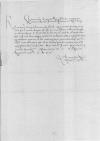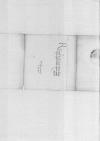List #5698
Sigismund I Jagiellon do Ioannes DANTISCUSCracow, 1539-12-02
| odebrano 1540-01-29 Rękopiśmienne podstawy źródłowe:
Publikacje:
| ||||||||
Tekst + aparat krytyczny + komentarzZwykły tekstTekst + komentarzTekst + aparat krytyczny
Reverendo in Christo Patri, domino
Reverende in Christo Pater, sincere nobis dilecte.
Queruntur
Bene valeat Paternitas Vestra.
Dat(ae) or Dat(um)⌈Dat(ae)Dat(ae) or Dat(um)⌉
Ad mandatum regiae maiestatis proprium


 AGAD, AZ, 2999, f. 175v
AGAD, AZ, 2999, f. 175v